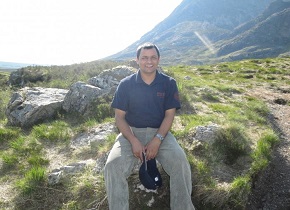People and tigers in Nepal
 Nepal plays a key role in conserving tigers. Most of the Nepalese tigers live in just a few National Parks. Bardia National Park is typical. It has other rare and endangered species, not just tigers, but rhino, leopard and more.
Nepal plays a key role in conserving tigers. Most of the Nepalese tigers live in just a few National Parks. Bardia National Park is typical. It has other rare and endangered species, not just tigers, but rhino, leopard and more.
Small rural communities live in a buffer zone around the park. The people farm and manage community forests in this buffer zone. They collect food, building materials and fuel from the jungle and graze their animals there. These farmers are among the poorest in the world, yet they accept the responsibility, at the front line of conservation, protecting an iconic species for all of us – our global heritage.
At Bardia, tiger numbers are increasing, thanks to the work of park staff, conservation agencies and local communities. Tigers and the animals they eat, such as deer, are no longer hunted in the park. Local Nepalis have played an important role in keeping poachers out. But success brings challenges for farmers when tigers stray into the buffer zone and eat their goats and cattle; or when the deer feed on their crops, the farmers carry the cost.
In the past, these losses led to revenge killing of tigers and hunting of their prey. Or more recently, turning a blind eye to illegal poaching, which threatened to undo successful conservation. (Sadly tigers are still much prized for their body parts in some countries can command very high prices.)
Tigers, and other wildlife in Nepal's National Parks, are big draw cards for international visitors. There are opportunities for some local Nepalis to earn a living, using their local knowledge as wildlife guides and running small family-owned hotels. Babu's PhD research will explore ways for whole communities to benefit from tiger conservation. If local people are rewarded, they are more likely and more able to support conservation. At present, local people wear the cost of conservation, but have little access to financial benefits. The intention is to find ways to reward them for their contribution to tiger conservation.
 Babu Ram Bhattarai is on leave from his position in the Nepalese Department of National Parks and Wildlife Conservation. He is beginning his PhD at Federation University Australia this July.
Babu Ram Bhattarai is on leave from his position in the Nepalese Department of National Parks and Wildlife Conservation. He is beginning his PhD at Federation University Australia this July.
Babu's PhD will investigate how the economic benefits of tiger conservation, tourist dollars and more, can be shared with local communities, so that people and tigers both benefit.
Babu is an experienced conservation biologist with a track record in successful conservation of large, carnivorous mammals. He knows Bardia National Park well, having worked there as a Ranger for more than two years. He was there recently leading a project to understand illegal hunting.
Further information
For more information on the above, feel free to contact us via our Wildlife Conservation Research contact page.